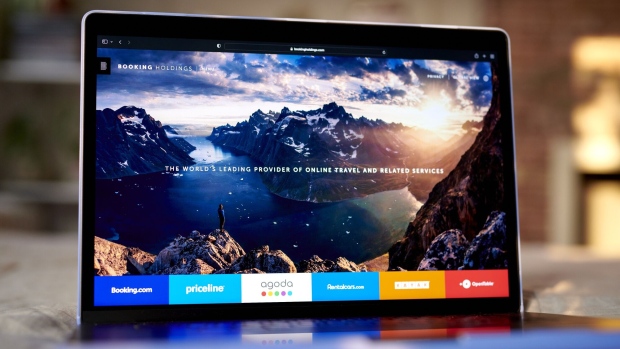May 2, 2024
Booking Beats on Room Nights as Travel Demand Remains Strong
, Bloomberg News

(Bloomberg) -- Booking Holdings Inc., owner of travel brands Kayak and Priceline, said it expects room-night reservations to slow in the current quarter as tensions in the Middle East curb regional tourism.
The company said it expects growth of 4% to 6% in room-night bookings, less than the 7.4% increase analysts were expecting. Gross travel bookings which includes taxes and fees, should rise 3% to 5%, the company said, also missing Wall Street’s estimates for 7.9% growth.
“As we look ahead to the second quarter, room night growth compared to last year will benefit from the shift in Easter timing,” said Chief Executive Officer Glenn Fogel. “However, we expect that this will be offset by less expansion of the booking window and an increased impact from the geopolitical situation in the Middle East. We believe this will result in some deceleration in room night growth” compared with the first quarter.
Norwalk, Connecticut-based Booking has greater exposure in Europe and the Middle East than rivals such as Expedia Group Inc. The vast majority of Booking’s total revenue — 89% — is from non-US travel, with the Middle East, including Turkey and Egypt, making up about 7% of global room nights. Israel alone represented about 1% prior to the war, the company has said.
Following several blockbuster quarters reflecting a post-pandemic travel boom, online travel companies like Booking, Expedia and Airbnb Inc have cautioned that it will be difficult to top the strong performance during the comparable early 2023 travel season.
Thursday’s results from Booking are a bellwether for global travel more generally, because it owns properties across the industry from flight aggregator Kayak to rentalcars.com and restaurant reservation site OpenTable. Its results offer clues as to whether demand is still fundamentally strong or is indeed tapering off ahead of the peak summer season.
Otherwise Rosy
The outlook overshadowed an otherwise positive first-quarter report that showed healthy demand in Europe and less-than-expected impact from the Israel-Hamas war, Chief Financial Officer Ewout Steenbergen said on the call.
Booking reported room nights booked for the three months ended March 31 grew 8.5% to 297 million. That surpassed the average analyst expectation for a 6.2% increase and 290.9 million room nights sold. Gross travel bookings were $43.5 billion, compared with average analyst projections of $42.2 billion.
The company’s adjusted earnings before interest, depreciation and amortization were $898 million. Wall Street was expecting $718.6 million. Adjusted earnings per share were $20.39, compared with analysts’ estimate of $13.94.
The board also declared a cash dividend of $8.75 per share payable on June 28.
The shares initially rose 7.3% in late trading before giving up most of those gains after Fogel gave the outlook on a call with analysts. The stock has risen about 26% in the past 12 months, outpacing the S&P 500 Index.
The global travel recovery has been uneven. Growth in the US has stagnated while demand in Europe and Asia Pacific markets has been more enduring, according to analysts at Jefferies.
Expedia Misses
Expedia, which also reported results Thursday afternoon, posted first-quarter gross bookings of $30.2 billion, missing analysts’ average estimate of $30.5 billion. The company cited a “slower than anticipated” recovery in its vacation rental business Vrbo. That, combined with slower-than-expected growth in the rest of its consumer business so far, led the company to lower its full-year sales guidance to “a range of mid to high single digit top line growth with margins relatively in line versus last year,” it said in a statement. Room night growth and revenue were otherwise in-line with estimates. Shares slid 8.7% in post-market.
“Vrbo’s recovery following the recent re-platforming has been slower than anticipated, which has put pressure on gross bookings,” said Expedia CEO Peter Kern. “As we enter the second quarter, we are seeing some acceleration in the rest of our B2C business and expect it to continue throughout the year.”
©2024 Bloomberg L.P.


